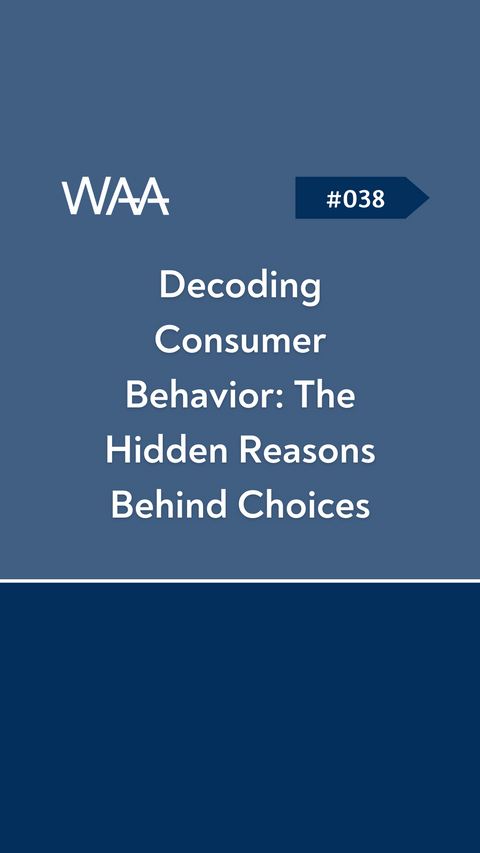
#038 Decoding Consumer Behavior: The Hidden Reasons Behind Choices
Consumer behavior is central to any successful marketing strategy. It refers to the actions people take when purchasing goods and services and can be influenced by a multitude of factors. Understanding consumer behavior means understanding the psychology behind why people make the choices they do. In today's digital and highly competitive world, understanding consumer behavior is crucial for any brand or marketer to stay ahead of the game.
The decision-making process of consumers can be complex, involving various factors that influence their choices. These factors may include personal experiences, social influences, cultural values, and economic factors such as price, quality, and availability. In essence, consumers' behavior is a mix of rational and emotional factors, and therefore, it is important to delve deeper into the "why" behind consumer behavior and uncover the hidden motivations that drive people to make certain decisions.
Game theory, a branch of mathematics that deals with strategic decision-making, provides valuable insights into consumer behavior. Game theory suggests that consumers are rational decision-makers who aim to maximize their utility, or the satisfaction they derive from consuming goods and services. Consumers are constantly assessing the costs and benefits of each available option and weighing the risks and rewards. Ultimately, they make choices that best align with their preferences.
However, sometimes consumers' choices are not as rational as game theory suggests. Behavioral economics, a combination of psychology and economics, shows that consumers do not always make rational choices and are influenced by a range of cognitive biases, such as availability bias, confirmation bias, and framing effect. Therefore, understanding consumer behavior means understanding the interplay between rational and irrational factors that drive people's choices.
Branding and storytelling are also crucial in understanding consumer behavior. People identify more with brands that reflect their values or that tell a compelling story that resonates with them emotionally. Companies that successfully create compelling brand identities and stories are more likely to establish an emotional connection with consumers, making them more likely to choose their products over others. This emotional connection is key to brand loyalty, which can be a powerful driver of long-term business success.
Marketing also plays a key role in shaping consumer behavior. By leveraging advanced data analytics and social media platforms, marketers can better understand their target audience and tailor their marketing efforts to better reach them. Marketers can influence consumer choices by using different techniques such as emotional appeals, celebrity endorsements, and social proof. Marketers can also use scarcity and urgency tactics to create a sense of urgency for consumers to take action before time runs out.
However, it is important to note that unethical marketing practices can also influence consumer behavior negatively. For example, manipulative and false advertising can deceive consumers into making choices that are not in their best interest and not aligned with their values. Therefore, marketers should prioritize ethical marketing practices that help consumers make informed choices rather than manipulating them for profit.
In summary, decoding consumer behavior is key to any successful marketing strategy. Game theory, behavioral economics, branding, storytelling, and marketing tactics can all provide valuable insights into the hidden motivations that drive consumer choices. Understanding the buyer's journey and crafting a compelling narrative can help marketers create a strong emotional connection with consumers and drive brand loyalty. Ultimately, focusing on the underlying psychology behind consumer behavior can help companies build a strong brand, grow their customer base, and contribute positively to society.
